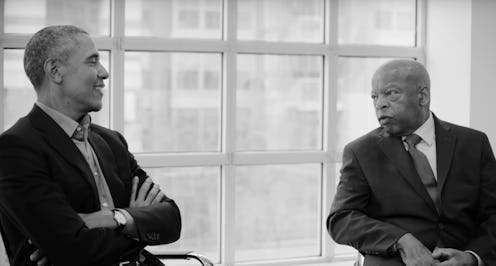News
Obama's New Video To Honor The MLK 50th Anniversary Is Such A Moving Tribute
On April 4, 1968, Martin Luther King Jr. was assassinated in Memphis, Tennessee, and Wednesday marks the 50th anniversary of his death. In order to commemorate the occasion, Barack Obama discussed MLK's legacy with John Lewis and a group of high school students in a new video released by the Obama Foundation.
At the beginning of the video, Lewis recalls where he was when he got the news that King had been shot — in Indianapolis, organizing a rally. Obama tells students from Washington, D.C.’s Ron Brown College Preparatory High School that Lewis was one of the people who made him want to become involved in public life.
"I thought that this would be a good opportunity to connect the people who inspired me with the next generation of young leaders who are going to be doing outstanding things themselves," Obama tells the students, whose all-male high school grew out of the Obama administration's My Brother's Keeper initiative.
The video then goes on to show a conversation between the students, Lewis, and Obama. During a particularly powerful moment, Lewis tells one of the students that he regretted not having spent more time with King.
"I thought he would be around a long time," Lewis says.
After a discussion about the impact that civil rights activism can have, another student then asks Lewis and Obama about the nature of controversy.
"In what way can being controversial be a benefit and a disadvantage?" the student asks.
Lewis uses the question as an opportunity to reflect on his speech at the March on Washington, and on how being controversial mattered less to him than saying what he believed. He is currently the only living speaker from the march.
“There were some people who suggested my speech was too extreme, it was too radical,” Lewis tells the students in the black-and-white video. “But I felt what I had to say was important to be said: Black people in the South couldn’t register to vote simply because of the color of their skin.”
Obama, meanwhile, urged the students not to let concerns about controversy prevent them from fighting for the causes they care about:
If you are speaking on behalf of social justice, then by definition there’s going to be some controversy because if it wasn’t controversial, then somebody would have already fixed it. Dr. King was controversial, but he studied and thought and crafted what he had to say. He knew, when he spoke, he was expressing a truth as well as he could know it.
Toward the end of the video, Lewis tells a story of reconciliation that he has shared in the past — a story about a Ku Klux Klan member who attacked him back in 1961 during the Freedom Rides and then approached him with an apology years later. Lewis recalls the moment in 2009 when the former Klan member and his son came to his office on Capitol Hill, and tells the students that he accepted the Klan member's apology. For Lewis, that moment was simply another example of the nonviolent resistance that he, King, and others practiced during the Civil Rights Movement.
"The two of them hugged me, and I hugged them back," Lewis says. "That's the power of the way of peace and love, and the power of the philosophy of nonviolence. You respect the dignity and the worth of every human being."
Obama and Lewis conclude the video by urging the students to speak out against injustice, even if being on the right side of history isn't always popular in the present moment.
"When you see something that is not right, not fair, not just, you have a moral obligation to do something, to say something, and Dr. King inspired us to do just that," Lewis says.
The video is part of the Obama Foundation's efforts to honor King on the 50th anniversary of his death. These efforts also include a campaign for people to discuss how King's legacy has inspired them to seek change, as well as a reflection on the 1963 March on Washington.
